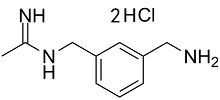All AbMole products are for research use only, cannot be used for human consumption.

1400W dihydrochloride is a potent and selective inhibitor of human inducible NO synthase with Ki values of 7 nM. 1400W inhibits iNOS induction in microglial cells, and reduces generation of NO, thereby mitigating oxidative stress and neuronal cell apoptosis in the rat cerebral cortex, and improving the spatial memory dysfunction caused by acute hypobaric hypoxia-reoxygenation.

Free Radic Biol Med. 2022 Mar;181:209-220.
Depletion of iNOS-positive inflammatory cells decelerates neuronal degeneration and alleviates cerebral ischemic damage by suppressing the inflammatory response
1400W dihydrochloride purchased from AbMole
| Molecular Weight | 250.17 |
| Formula | C10H15N3.2HCl |
| CAS Number | 214358-33-5 |
| Solubility (25°C) | Water 50 mg/mL DMSO 20 mg/mL |
| Storage |
Powder -20°C 3 years ; 4°C 2 years In solvent -80°C 6 months ; -20°C 1 month |
| Related NO Synthase Products |
|---|
| L-Arginine-13C6,15N4 hydrochloride
L-Arginine-13C6,15N4 hydrochloride is the 13C- and 15N-labeled L-Arginine hydrochloride. |
| FeTPPS
FeTPPS acts as a peroxynitrite scavenger and anti-nitrating agent in vivo. FeTPPS reduces nitric oxide (NO) production and apoptosis process. FeTPPS possesses evident neuroprotective effects in a experimental model of spinal cord damage. |
| (S)-ZLc002
(S)-ZLc002 is a S-enantiomer of ZLc-002. |
| GW274150
GW274150 is a potent, selective, orally active and NADPH-dependent inhibitor of human inducible nitric oxide synthase (iNOS) (IC50=2.19 μM; Kd=40 nM) and rat iNOS (ED50=1.15 μM). |
| NOS-IN-1
NOS-IN-1 is a potent and orally active NO synthase (NOS) isoforms inhibitor with IC50s of 0.1 μM, 1.1 μM, and 0.2 μM for human iNOS (hiNOS), heNOS and hnNOS, respectively. |
All AbMole products are for research use only, cannot be used for human consumption or veterinary use. We do not provide products or services to individuals. Please comply with the intended use and do not use AbMole products for any other purpose.


Products are for research use only. Not for human use. We do not sell to patients.
© Copyright 2010-2024 AbMole BioScience. All Rights Reserved.
